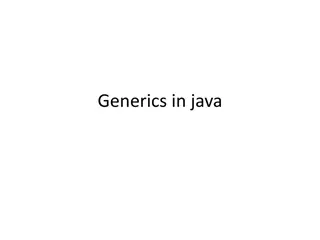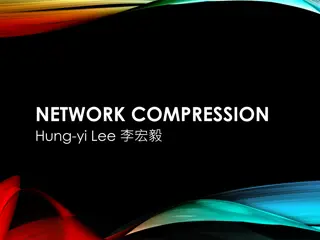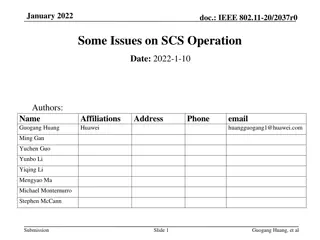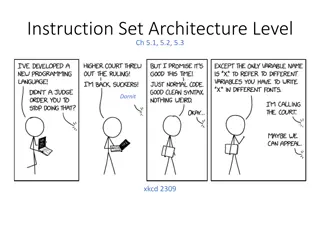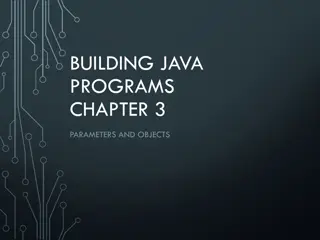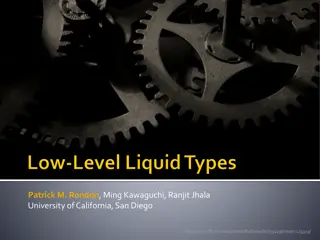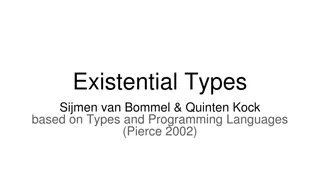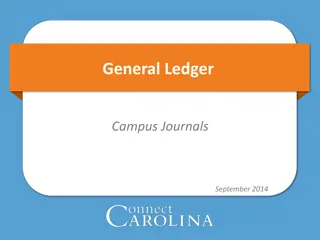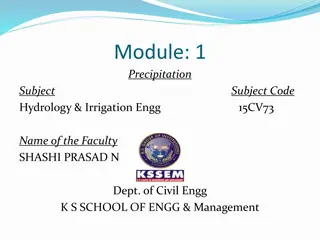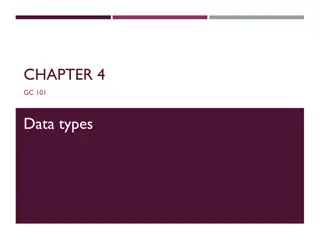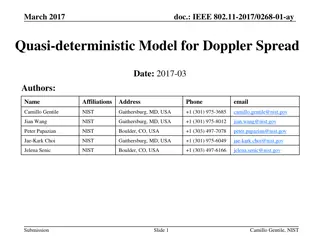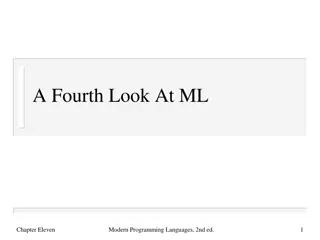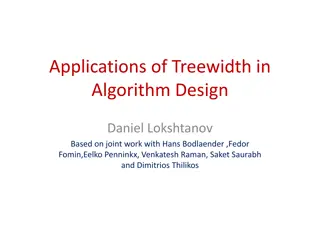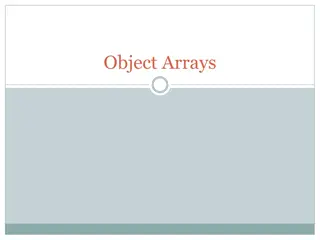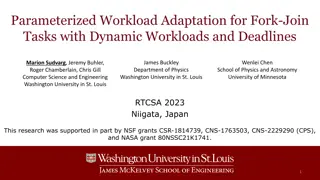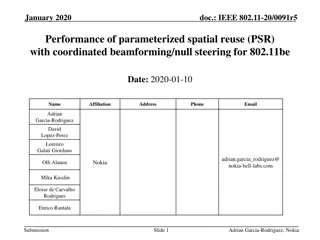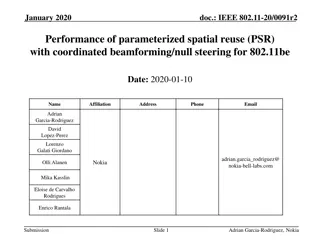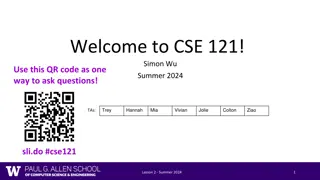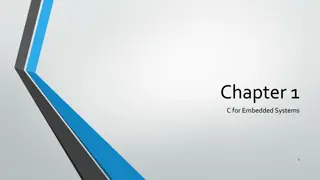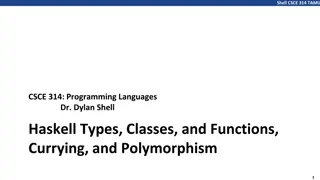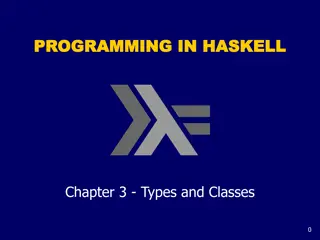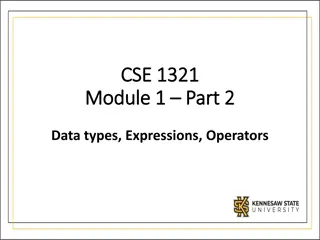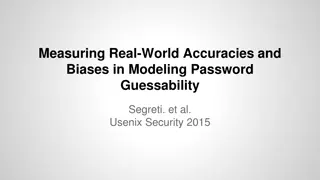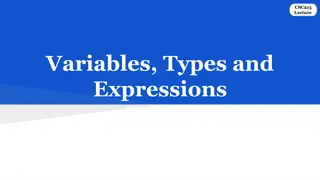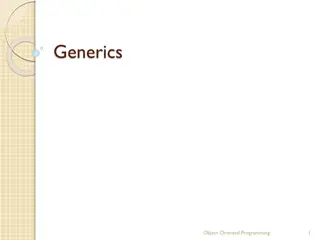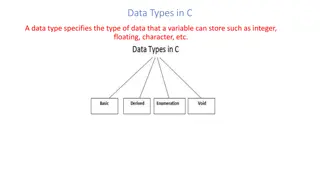Blood Groups and Their Significance
Human blood types are determined by specific antigens and antibodies present on red blood cells, influencing crucial aspects like blood transfusions and familial relationships in forensic medicine. The ABO system, with its four main blood types (A, B, AB, O), plays a vital role in categorizing blood
7 views • 14 slides
Generics in Java
Generics in Java allow for parameterized types, enabling the use of different data types in classes, interfaces, and methods. By creating generic entities, such as classes that work with various data types, Java programmers can write more flexible and reusable code. This concept is demonstrated thro
1 views • 16 slides
Network Compression Techniques: Overview and Practical Issues
Various network compression techniques such as network pruning, knowledge distillation, and parameter quantization are discussed in this content. The importance of pruning redundant weights and neurons in over-parameterized networks is highlighted. Practical issues like weight pruning and neuron pru
2 views • 37 slides
Issues with SCS Operation in IEEE 802.11be Standard
The document discusses technical issues related to the SCS (Spatial Channel Sharing) operation in the IEEE 802.11be standard. It highlights inconsistencies in the standard regarding parameterized QoS requirements, mixing of traffic streams with different QoS needs, and challenges in prioritizing SCS
0 views • 15 slides
Instruction Set Architecture and Data Types in Computer Systems
In computer architecture, the Instruction Set Architecture (ISA) level is crucial in defining how a processor executes instructions. This includes the formal defining documents, memory models, registers, and various data types that can be supported. The ISA level specifies the capabilities of a proc
3 views • 13 slides
Constructors and Destructors in C++
Constructors in C++ are special member functions that initialize objects of a class. They are automatically called when an object is created and have the same name as the class. Constructors differ from normal functions as they do not have a return type and are automatically invoked upon object inst
1 views • 12 slides
Hotel Classification and Types
Hotel classification and types cover various aspects such as facilities, services, amenities, guest types, and factors influencing hotel classification. From resort hotels to airport hotels and city center accommodations, each hotel type serves different purposes and caters to diverse guest preferen
1 views • 44 slides
Comprehensive Guide to Wound Care: Types, Dressings, and Practices
Understanding wound care is crucial for proper healing. This guide covers types of wounds, purposes of wound dressing, different dressing types, and helpful practice guidelines. Learn about intentional and unintentional wounds, dressing purposes like protection and absorption, and types of dressings
1 views • 10 slides
Contract Types and Incentives Under ProTech
Explore the factors influencing contract types selection, including price competition, cost analysis, and technical capability. Learn about different contract types like fixed-price and cost-reimbursable, each with unique characteristics and risks. Discover the spectrum of contract types and incenti
0 views • 21 slides
Modernisation of Higher Education in Central Asia Through New Technologies
The project focuses on the modernisation of higher education in Central Asia through the integration of new technologies. It highlights initiatives in Turkmenistan and discusses aspects like control-measurement devices, automation of technical systems, and electrical engineering. The use of contact
1 views • 20 slides
Parameters and Objects in Java Programs
Explore the concepts of parameters and objects in Java programming, including examples of redundant recipes, a parameterized recipe, and a redundant solution. Learn how parameterization can streamline coding by passing values to methods, improving code efficiency. Discover the importance of variable
1 views • 24 slides
C Program Refinement Types with Liquid Types and Invariant Discovery
Discover the integration of Liquid Types and Refinement Types in C programming through Invariant Discovery, leading to automatically adapting C programs to fit Liquid Types. Explore challenges and solutions in expressing invariants, handling unknown aliasing, and implementing strong updates within t
0 views • 24 slides
Atlas HR eServices - Leave Types and Application Procedures
This content provides detailed information on various leave types and application procedures within the Atlas HR eServices platform. It covers topics such as Jury Duty Leave, Compensatory Day Off, Floating Holiday (NY), Official Business, Rest & Recuperation, along with guidelines on how to apply fo
0 views • 12 slides
Parameterized Post-Friedmann Framework for Interacting Dark Energy
Dive into the complexities of considering interacting dark energy (IDE) using a parameterized post-Friedmann framework. Learn why IDE is essential, how to detect couplings, calculate perturbation evolutions, and address instability issues. Explore the one-parameter extensions like wCDM and I.CDM, an
0 views • 18 slides
Existential Types and Type Manipulation in Programming Languages
Explore the concepts of existential types, type abstraction, type ambiguity, packing, and unpacking in the context of programming languages. Learn how to work with hidden types, universal types, and the nuances of type manipulation. Examples and illustrations are provided to enhance understanding.
1 views • 17 slides
Campus Journals and General Ledger Overview
Campus Journals in September 2014 cover various topics such as Icebreaker activities, Ground Rules, Safety procedures, Disclaimers, Class Format, Agenda for the session, Campus Journal types, and Transaction Types. The content includes descriptions of different journal types and transaction types, a
0 views • 43 slides
Precipitation: Forms and Types Explained
Precipitation, any form of moisture reaching Earth's surface from the atmosphere, encompasses various types like rain, snow, drizzle, glaze, sleet, and hail. Each type has unique characteristics, densities, and formation processes. Additionally, precipitation can be classified into convection, cyclo
1 views • 38 slides
Java Data Types and Variable Declaration
Dive into the world of Java data types and variable declaration with this comprehensive guide. Learn about primitive data types, declaring variables, integer types, floating-point data types, character data type, and boolean data type. Master the art of assigning names and data types to efficiently
0 views • 31 slides
Parameterized Model for Doppler Spread in mmWave Systems
This document presents a parameterized model for Doppler spread in mmWave systems based on measurements with an 83 GHz channel sounder. The model is linked to the Quasi-deterministic (QD) propagation channel model adopted by the work group. It discusses Doppler frequency shift, channel sounder confi
0 views • 10 slides
ML Type Definitions and Constructors
Explore the concepts of type definitions and constructors in ML, including predefined and user-defined types, data constructors, and type constructors. Learn how to create new types, define constructors, and work with parameterized constructors in Modern Programming Languages.
0 views • 43 slides
Applications of Treewidth in Algorithm Design
The study delves into the efficient algorithms for graph problems using treewidth, focusing on planar and general graphs. The research investigates the complexities, parameterized algorithms, kernels, and approximation schemes for problems on planar graphs through bidimensionality, emphasizing the s
0 views • 55 slides
Mastering Generics in Effective Java: A Practical Guide for Java Programmers
Explore the world of generics in Java through Joshua Bloch's guidance in "Effective Java". Learn the importance of avoiding raw types, leveraging parameterized types for type safety, handling mixing of generic and raw types, and implementing wildcards for flexible and typesafe coding. Enhance your J
0 views • 30 slides
Arrays of Objects and Primitive Types
Arrays of objects provide a way to store and manage multiple instances of complex data types, similar to arrays of primitive types. This content explores the concept of arrays of objects, how to declare and allocate memory for them, and how to work with arrays of primitive types like double and int.
1 views • 25 slides
Parameterized Workload Adaptation for Fork-Join Tasks with Dynamic Workloads and Deadlines
In dynamic environments, tasks may face unknown workloads and deadlines, leading to system overload and missed deadlines. This research focuses on adapting task workloads to provide results before the deadline by adjusting computational parameters. It explores how to minimize degradation of result u
0 views • 31 slides
Performance Evaluation of Parameterized Spatial Reuse with Coordinated Beamforming for IEEE 802.11be
The study focuses on assessing the performance of parameterized spatial reuse (PSR) with coordinated beamforming/null steering for IEEE 802.11be. The framework allows coordinated sharing of uplink transmission opportunities among APs, demonstrating gains in synchronous coordinated beamforming system
1 views • 19 slides
Performance Evaluation of Coordinated Beamforming with Parameterized Spatial Reuse in IEEE 802.11be
The document discusses the performance evaluation of coordinated beamforming with parameterized spatial reuse (PSR) in IEEE 802.11be. It explores the practical operation of the 802.11ax PSR framework with null steering and the key implementation benefits, emphasizing unsynchronized operation and ada
0 views • 20 slides
Data Types, Expressions, and Operators in Java
This resource provides information on data types, expressions, and operators in Java. It covers topics such as data types (int, double, String, boolean), operator precedence, and practice problems to work on expressions and types. The content includes announcements, reminders, a recap of data types,
0 views • 20 slides
Data Types and Operations in C Programming for Embedded Systems
Explore the importance of selecting appropriate data types and bitwise operations in C programming for embedded systems. Learn about the sizes of data types, performance considerations, ANSI C integer data types and their ranges, handling overflow issues, and coercion in programming. Enhance your kn
0 views • 17 slides
Haskell Types, Classes, Functions, and Polymorphism
In Haskell, types are collections of related values, ensuring type safety through compile-time type inference. Type errors occur when functions are applied to arguments of the wrong type. Annotations help define types, and Haskell offers basic types like Bool, Char, String, Int, Integer, Float, and
0 views • 30 slides
Types and Classes in Haskell Programming
Types in Haskell are names for collections of related values, allowing for safer and faster programs by catching errors at compile time. Haskell supports basic types like Bool, Char, String, Int, Integer, and Float, as well as list and tuple types. Type errors occur when functions are applied to arg
0 views • 27 slides
Introduction to Python Data Types, Operators, and Expressions
Understanding data types, expressions, and operators is fundamental in Python programming. Learn about Python's principal built-in types such as numerics, sequences, mappings, and classes. Explore numeric types, strings, and their operations like concatenation, escape sequences, and conversions betw
1 views • 20 slides
Password Guessability Metrics in Real-World Security
Delve into the realm of password guessability metrics to enhance password security. Explore how measuring guessability aids in eliminating weak passwords, aiding users in creating stronger ones, and assessing security against various cracking algorithms. Uncover the significance of statistical and p
0 views • 27 slides
Variables, Types and Expressions
This lecture covers the fundamentals of variables, data types, and expressions in programming. It discusses naming rules for variables, basic and derived data types, operators, and variable initialization. Additionally, it explores data types such as char, int, float, double, pointers, arrays, struc
0 views • 25 slides
Generics
Generics in Java allow for compile-time error detection by enabling the definition of classes, interfaces, or methods with generic types. This feature replaces generic types with concrete types, such as with the ArrayList class in Java. Discover motivations, benefits, defining generic classes, metho
0 views • 32 slides
Data Types in C
In C programming, data types specify the type of data a variable can hold such as integer, floating, character, and more. This article covers the basic data types, memory sizes, keywords, and identifiers used in C programming. It discusses integer-based and floating-point based data types, supported
0 views • 8 slides
Database systems
This content provides a comprehensive overview of various data types used in database systems, including numeric, string, date and time, and others. It covers different categories such as numeric data types in MySQL, Microsoft SQL Server data types, and string data types in MySQL. The images include
0 views • 19 slides
Synthesis of CC Mammogram & Multi-view Classification using Neural Network
This project proposal focuses on synthesizing CC view mammograms from MLO view using CR-GAN, followed by multi-view breast cancer classification using Parameterized Hypercomplex Neural Network. The methodology involves tasks such as CC view generation, employing PHResNets for classification, and add
0 views • 14 slides
Project Proposal
This project proposal focuses on synthesizing CC view mammograms from MLO view using CR-GAN, followed by multi-view breast cancer classification employing a Parameterized Hypercomplex Neural Network (PHNN). By leveraging advanced deep learning techniques, the aim is to improve classification accurac
0 views • 16 slides
- Hindley-Milner Type Inference & Type Systems
- This content explores the concepts of Hindley-Milner type inference, type systems, parameterized types, explicit polymorphism, and implicit polymorphism in programming languages. It discusses how programmers declare types for variables and the use of generics in languages like Java and C#. The exa
0 views • 35 slides
Templates
Templates in C++ allow for the creation of generic pieces of code that can be parameterized by types, classes, and integer constants. They provide a powerful tool for creating reusable code and enable compile-time polymorphism. This text delves into the different aspects of templates, from template
0 views • 9 slides

